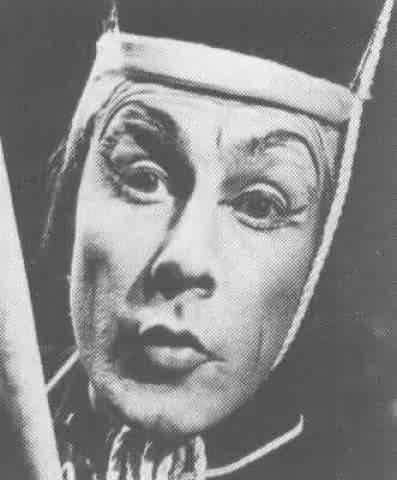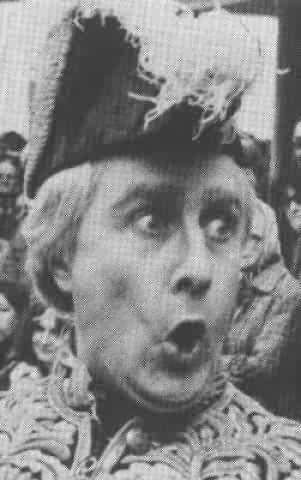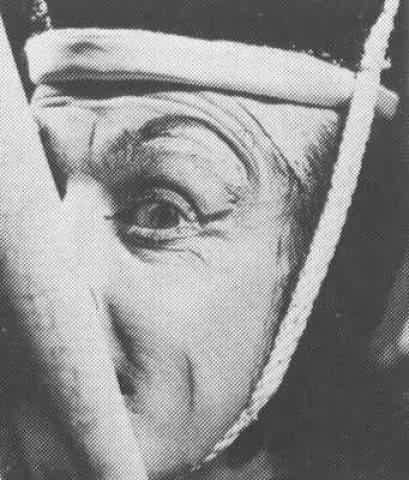|
|
|
 |
Despite the approval of audiences, colleagues and critics, James feels thoroughly miserable if he has not played to the uncompromising standards he sets for himself. "I am my own sternest critic," he concedes. In the frenzied activity of a busy touring company, he learnt to cut his losses to some extent, but his sights were still set remarkably high.
James was born in Timperley, Cheshire. He received no direct encouragement towards a stage career; but the theatre was unquestionably in his blood. His father had been on the stage, and as a music hall comedian his grandfather had shared the bill with George Grossmith. From the age of five, James was a regular visitor to the Palace Theatre in Manchester, and although very young, he was profoundly impressed by the aura of great artists like Ivor Novello, Noel Coward, Cicely Courtnedge, Judy Garland and many others.
He was later to appear himself at the Palace Theatre with an amateur society and eventually as a professional artist. "It was a great joy for me" he recalls "to return with the D'Oyly Carte Company for the reopening of the theatre."
As a boy soprano, James sang as head choirboy at the local church, and Altrincham Grammar School introduced him to the Savoy operas. Successes in school productions included the roles of Katisha and Mad Margaret! With the prospect of G & S rehearsals at four o'clock, afternoon Latin lessons seemed interminable.
"The Pirates of Penzance" was the opera in which he first took part, and by coincidence it was in the same opera that he was to gain his first principal role with D'Oyly Carte.
In fact James made his debut for D'Oyly Carte as a 'super' at the age of 12. During a season at the Manchester Opera House he was paid 10/6d per week as the Midshipman in "H.M.S. Pinafore", and as Ko-Ko's assistant he carried the executioner's axe in "The Mikado".
"On leaving school, I desperately wanted a theatrical career;" he says. If there were any doubts, a brief venture into personnel work helped to dispel them. After winning a scholarship to the Royal Northern College of Music, he gained a performing and teaching diploma and was awarded the Imperial League of Opera Prize. College holidays were all spent performing at York Repertory and Granada TV The London Opera Centre followed, culminating in four and a half years at Covent Garden. There he played small parts and cameos besides singing with the chorus.
In his teenage years, early enthusiasm for Gilbert & Sullivan declined with wider musical discoveries. However; with maturity came a fresh appraisal. "I realised that the pieces were unique and absolute pearls in their own right" he concludes. "They cannot be classified with any other art form, with the possible exception of Offenbach - who incidentally did not have a librettist as good as Gilbert."
 |
It was thus an informed and appreciative artist who auditioned for D'Oyly Carte in 1973. The Company recognised his abilities at once and offered him a contract to sing in the chorus and understudy the comedy roles in all the operas. Soon he also acquired the parts of the Major-General, Major Murgatroyd, the Foreman and Antonio. It was a schoolboy ambition come true - and intensely hard work!
Having set the operas in perspective. James is disappointed when others fail to do so. "Drama critics, music critics and dancing critics often judge us from a limited standpoint," he claims, "without always acknowledging the unique blend of ingredients."
An eminent Manchester music teacher once remarked to James that 6 & S 'was not really singing'. Following a closer analysis teaching female roles, he phoned James to say he has completely changed his mind, perceiving the considerable technical difficulties. James believes that members of the Company should not underrate their impressive combination of skills: besides singing, they are required to move well, render dialogue convincingly, and dance more than ever before. They also have to manage the awkward transition from dialogue to song which frequently poses problems for singers of grand opera.
James approaches Savoy tradition with care. In the operas he finds a delightful intermingling of Victorian charm with satire that is never dated. He sees tradition as a matter of style and as a process of evolution. The pieces were no longer played as he remembers them in the 'fifties, yet the characteristic style had remained.
"I favour a natural approach to productions," he maintains, "as long as a degree of theatricality is preserved." By way of illustration he cites Ashton's later ballets, where great truth and feeling co-exist with an unequivocal theatrical experience.
The new production of "The Mikado" demanded a lot of re-thinking from the whole cast. Ko-Ko emerged as a complex, chameleon character who gets his way by wheeling and dealing. For James the challenge was fascinating and rewarding. How sad that it was not staged until the closure of the Company was imminent.
In his spare time James enjoys fell walking and reading autobiographies. He succeeded in coming to terms with stage nerves and in channelling their impact constructively "I concentrate on a radiation of joy within, I hope this will communicate to the audience" he explains. "It begins as a discipline but can mature into reality"
Paradoxically, comedy is a very serious business indeed. Careful planning and timing are essential, and James welcomed more rehearsal time to polish and perfect his work - though he realised this was not always financially possible.
Spontaneous humour was not lacking, however. James is an accomplished mimic, and has taken his turn at falling over on-stage, dropping his fan - and (almost) his trousers! During one performance of The "Pirates of Penzance" he twice received complaints that his trousers were unbuttoned. In fact they were chastely fastened! (A fig leaf of the imagination perhaps?)
James delighted in the comic character roles which he felt privileged to inherit from John Reed in 1979. His memorable portrayals include Jack Point, Ko-Ko, John Wellington Wells, the Lord Chancellor, Sir Joseph Porter and King Gama.
 |
"My favourite role was the one I happened to be doing best at the time," he declares, "but I do have a soft spot for Sir Joseph." In his interpretation the character became slightly more snobbish.
One of the problems of characterisation for the principal comedian is to decide how far to step out of character in order to engage in the eccentric dances of the encores. James felt complimented in his performance when people failed to recognise him at the stage door after a show - particularly after he had been playing one of the older parts.
James pays warm tribute to the prestige acquired by the Company, and to its part in a great theatrical tradition. He loves the music and wit of the operas, and the splendid roles which they contain.
At the time of this interview there were rumour s of D'Oyly Carte re-emerging in another guise. "I hope the Company will venture forward" he said "through imagination, evolution and re-organisation to reach a new, all-time peak of achievement." And nothing would have pleased him more than to share in such a future.
| Artist Index | Main Index |